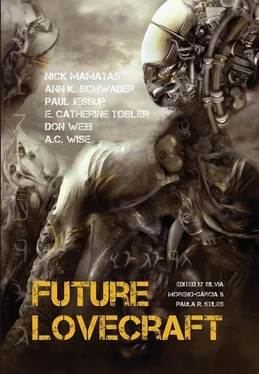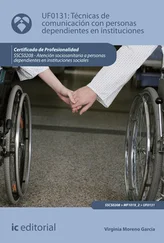He walks here as he walked in the Labyrinth, one foot in front of the other, keeping his mind focused always on McCabe. This house isn’t separate from the Labyrinth, he knows. It’s part of it, maybe the greatest part, and here, more than ever, he must be very careful.
He tries to clear his mind of expectations, and so, he is surprised when he suddenly stops walking. He’s standing in the doorway to a room. At first glance, it’s not different than any of the other rooms he’s passed, but then it is. It’s furnished, with a fireplace and a single, high-backed chair, and the window in the far wall is covered with a thick, velvet curtain. Kendrick stands in the doorway for a long moment, holding his breath, and then he steps inside.
“McCabe,” he says, because he knows that McCabe is sitting in the chair, turned away from him, facing the window. He knows in the same way he’s known all along which way to turn his feet to find this place.
There’s no answer, not right away. Instead, the figure in the chair stands slowly and turns to face him.
In the waking world, Kendrick isn’t a handsome man. He was, once, when he was young, but a poorly-healed job of plastic surgery done to repair a face mangled by a broken bottle left him much the worse for wear. In the dreamland, though, he has greater control over his features and he always looks as he did when he was a young man, the way he still sometimes sees himself in his own dreams.
Kendrick has never seen McCabe in the Labyrinth, before, and he had never thought to ask what the other man looked like here. He’s surprised to see his friend looking old, worn, tired beyond his years. His hair, which is still black in the waking world, is grey, here, and wrinkles of worry mar his eyes. He looks, Kendrick thinks without being able to stop himself, like a man who might welcome death.
“I had hoped they wouldn’t send you,” McCabe finally says, when they’re facing each other across the suddenly-small room. “Though I knew they would. And, to be honest, once I failed the job, myself, I needed them to, because I knew there was no one else I could trust.”
Kendrick hasn’t rehearsed the lines he’ll say now. He’s kept them out of his mind, just as he keeps everything out when he’s inside the Labyrinth, everything except the thought of his quarry. “Why?” he asks and he’s surprised, himself, by the notes he hears in his voice, the betrayal, the hurt.
“I’m sorry,” McCabe says. He doesn’t step forward; he stays standing by the chair and Kendrick can see the effort it takes him not to turn his eyes back toward the curtains. “I suppose I should have come to you, first, but I wanted to spare you. I see now that I couldn’t, that, no matter what I did, you’d have found your way here, sooner or later. I wish I could have, though, that there’d been a way. Now, more than ever. Now that I know what you would do for me, how far you’d go.”
Kendrick feels like he should be confused by what McCabe is saying, but it makes a strange kind of sense. McCabe learned something. Of course he did. Something that he wanted to keep secret. But men like he and Kendrick were in the business of finding secrets, of running them to the ground, even in places like this, places made of secrets. So, he tried to hide in the one place he knew that no one, not even dreamhounds, could track him: death.
“You should have told me,” Kendrick says, taking a step forward. “I could have helped. I could’ve protected you.”
McCabe shakes his head, takes a step back to match the one that Kendrick has taken forward, which makes him freeze. He’s made a mistake, he realises. He’s misunderstood something.
“I’m not protecting the secret, Kendrick,” McCabe says sadly and Kendrick can see that there are tears in his eyes, this man whom he’s seen shot, who he’s seen kill, and never seen shed a tear. “I was protecting you. But I can’t, not anymore. You’re here, now, and even if I could make you leave without explaining, without showing you, you’d come back. Again and again, until you found out. Wouldn’t you? Even if I asked you to leave it alone? Even if I asked you to walk away?”
“I’d try,” Kendrick says, softly.
“But you’d fail, yes?”
A nod.
“I know. I would, too, if our places were reversed. I’d come here, eventually, to see what it was that had taken you from me. So, I’ll show you, I will, but you have to promise me something first.”
Kendrick nods again, knowing already that he’s lost, somehow. Lost a friend and more than that. “Anything,” Kendrick says, and McCabe tells him the secret, and then he pulls down the curtains and shows him.
✻ ✻ ✻
The men guarding the two bodies are bored. It’s been three hours since Kendrick plugged into the machine and dropped away from the waking world, and since then, they’ve had nothing to do but stand and wait. There’s nothing here to guard, not really, but their jobs depend on them staying, so they stay. The technician who monitors the readouts on the dozens of screens connected to McCabe and Kendrick is asleep in a chair. One of the guards stares out the big picture window; the other plays solitaire on his phone. Neither is prepared when Kendrick suddenly wakes up.
Normally, riders coming back from the Labyrinth are sluggish, half-drunk from the things they’ve seen, their senses still attuned to the dreamland. But Kendrick is a professional, one of the best, and he’s gotten accustomed to acclimating quickly. He’s on his feet before the machines can give their warning beep and he’s crossed the room before the guard has even looked up from his phone. Before the technician has come awake, Kendrick has the first guard’s gun out of his shoulder holster and is using it to kill the second guard, whose phone drops to the floor and shatters. The first guard tries to elbow him, but Kendrick steps back, faster than he looks, and shoots the guard twice, once in the back and once in the side.
If the technician hadn’t been asleep, he might have had time to run. Might have made it as far as the door of the hotel room. But as it is, by the time he’s gathered his wits enough to be afraid, Kendrick is already standing over him, his finger already squeezing the trigger. Then he walks over to McCabe and begins unplugging machines. McCabe will die on his own, given time, without the machines to keep him alive, but there will already be more men coming and neither of them has that much time. Kendrick touches his friend’s cheek, puts the gun under his chin, and pulls the trigger.
The door of the hotel room is already locked, but he pushes a chair under the handle to slow the men who’ll be coming to break it down. Then he walks over to the window and looks out and down, down all those many stories to the street below. He could do for himself the same way he did for McCabe and he will, if he has to, but he wants a few more minutes, first. He can hear the men out in the hallway, already, hear their muffled shouts and the banging on the door. It won’t be long until they’re inside. He looks down at the gun in his hand.
Three shots are enough to shatter the window and then he steps out. For a moment, he’s flying, flying as he sometimes does in his own dreams, and then he stops dreaming for good.
✻ ✻ ✻
“We’re so goddamned arrogant,” McCabe had said in that room, in the heart of the Labyrinth. “We think we’re the masters of this place, the makers of it, that it sits out here for our entertainment, our enlightenment, our edification. But we’re fools and we’re wrong. That’s the secret, Kendrick, just that.
“Look at this place. Look around. It doesn’t seem familiar, does it? This isn’t something we made with our thoughts, our wishes, our prayers. This place is a dream, of course it is; what else could it be? But it’s not our dream.” And here, he had pulled down the curtain, torn it from the wall, and Kendrick had felt himself carried to the window to look out across a vast expanse, like an alien planet, with hillocks that darted at the movement of the eyes beneath, and vistas that rose and fell with gigantic breath. He had seen the great, dreaming, cyclopean thing and he had finally understood.
Читать дальше












